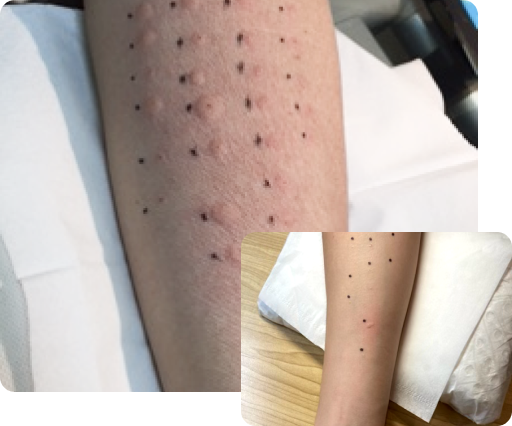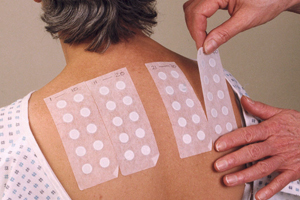

 Allergic Reactions
Allergic Reactions Respiratory Allergies
Respiratory Allergies Skin Allergies
Skin Allergies Gastrointestinal Allergies
Gastrointestinal Allergies Allergic Headaches
Allergic Headaches Throat and Ear Allergies
Throat and Ear Allergies Other Allergies
Other Allergies

Extract Taken from www.virtualmedicalcentre.com
A RAST test measures the level of allergen-specific IgE in your blood. That is, it measures the concentration of antibodies your body has created to against a particular food allergen. Interpreting a RAST result is slightly more complicated, however. This is because not everyone with the same concentration of allergen-specific IgE in their blood will react in the same way to the presence of an allergen in vivo (that is, in the flesh).
Someone with a relatively low concentration of allergen-specific IgE may have a fairly severe reaction while someone with a higher concentration of allergen-specific IgE may not react at all — that is, they’re not truly allergic to a food even though the blood test comes out positive. (This is known as a false positive.) RAST tests have a high sensitivity and fairly low specificity, meaning that they have a low rate of false positives and a fair number of false negatives, though this varies by allergen. In general, lower rates of allergen-specific IgE are correlated with a lower chance of reacting in a double-blind food challenge or in a real-world setting, especially if skin test results are negative and if there’s been no history of reaction to a given food.
Different foods have different specific IgE levels that are considered “predictive.” Where most people with a given level of specific IgE may react to one particular food, most people with that same level of specific IgE may not react to another food. Researchers determine these threshold levels by comparing RAST test results to the results of double-blind food challenges in order to find a level of specific IgE on the blood test where a very high percentage of people are truly allergic. This means that someone whose test results “look” identical for two different foods may be considered to have a positive result for one and a negative result for the other, if the foods have different threshold levels.
Specific IgE tests are usually returned in units of micrograms per milliliter (μg/mL). Some, however, are returned on a numerical rating scale (often, but not always, from 0 to 5 or 6). On rated tests, 0 almost always indicates an exceedingly low chance of a true food allergy, while the higher numbers normally mean very strong probability of allergy and a strong likelihood of a severe reaction. Your allergist may use these results to help determine some aspects of your treatment — to see whether a child is showing signs of outgrowing a food allergy, for instance.
We partner with you to stop your allergic reactions. Train your body to tolerate your allergies with clinically backed treatments made for you.
With our sublingual immunotherapy you can treat your allergies from the convenience of your home
Our office is designed for maximum efficiency, safety, comfort and functionality.
Our goal is to empower you with cutting-edge scientific information, and together, make a treatment plan that fits your lifestyle and budget.


Avoid fragrances, stop certain medications as directed before your appointment to ensure accurate testing, and please inform the nursing staff if you are taking beta-blockers or tricyclic antidepressants. Also, refrain from using specific nasal sprays a week before testing.

On allergy testing day, the doctor will assess your history and choose allergens to test. The nurse, supervised by the doctor, will conduct the tests. Based on the initial results, further testing may be done the next day to gauge your sensitivity, depending on your chosen treatment with the doctor.

After your initial consultation, you'll undergo testing for inhalant and food allergies that the doctor suspects could be the cause of your allergy. We use both forearms to test for multiple allergens, aiming to obtain a comprehensive understanding of your allergic condition.

We provide immunotherapy and educate our patients on allergy-free living. We offer two types of immunotherapy: custom sublingual vaccines tailored to your sensitivity and injections administered under doctor supervision to gradually desensitize you to allergens. Unlike costly over-the-counter options, our sublingual vaccines are tailored and effective.

We'll schedule a follow-up appointment six months after starting treatment to assess your progress. Regular testing every six months will help strengthen your immunotherapy until your allergic symptoms improve.


Qualified and Dedicated Medical Professional
Allergy testing identifies allergens that cause allergies. If allergies are not treated they can often get worse and weaken your immune system and set you up for dangerous complications such as bacterial or fungal infections in the sinuses, lungs, ears or skin. Testing for allergies is particularly important in children to ensure that more chronic conditions do not develop from untreated allergies.
Most allergic tests involve minimal discomfort. Skin prick tests may cause slight itching or a pricking sensation, but it’s generally tolerable.
Most of your results will be determined on the day of your test. If not the first day by the second appointment. If Dr Baker prescribes a blood test this can take longer.
There can often be delayed reactions which are relevant. These are monitered by our team.
We are a Medicare Accredited Medical Practice.
Immunotherapy by injection is covered by medicare. Some private insurance companies cover the sublingual vaccine costs.
We treat everything from allergies to tonsilitis – for the full list click here
Visit us L7 William Bland Centre 229 Macquarie Street Sydney, NSW, 2000
Call us on (02) 9221 1511